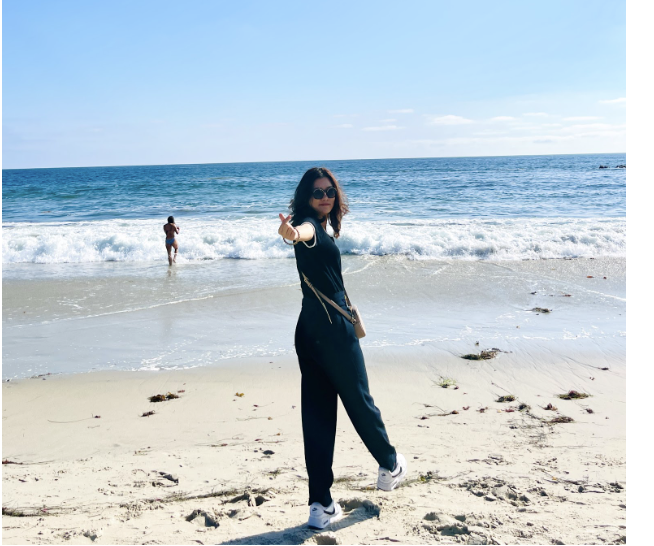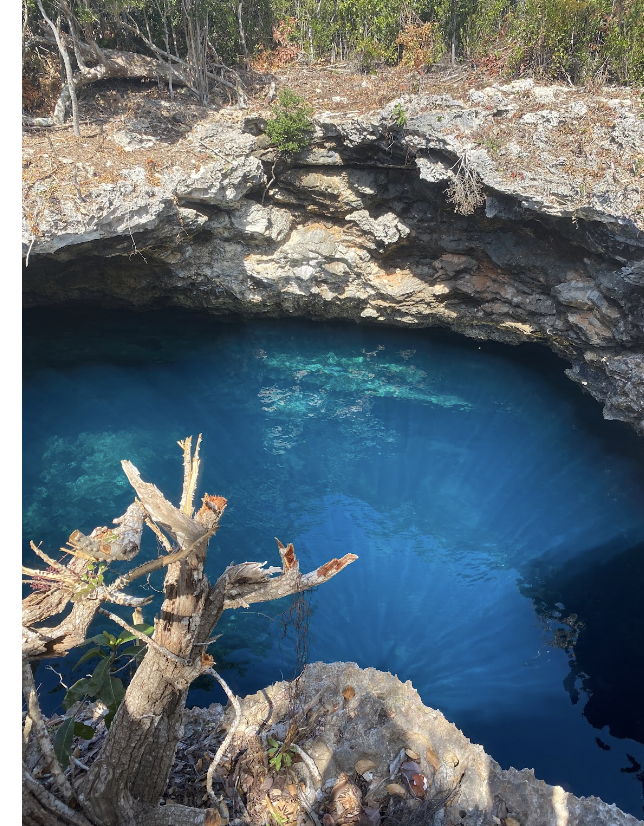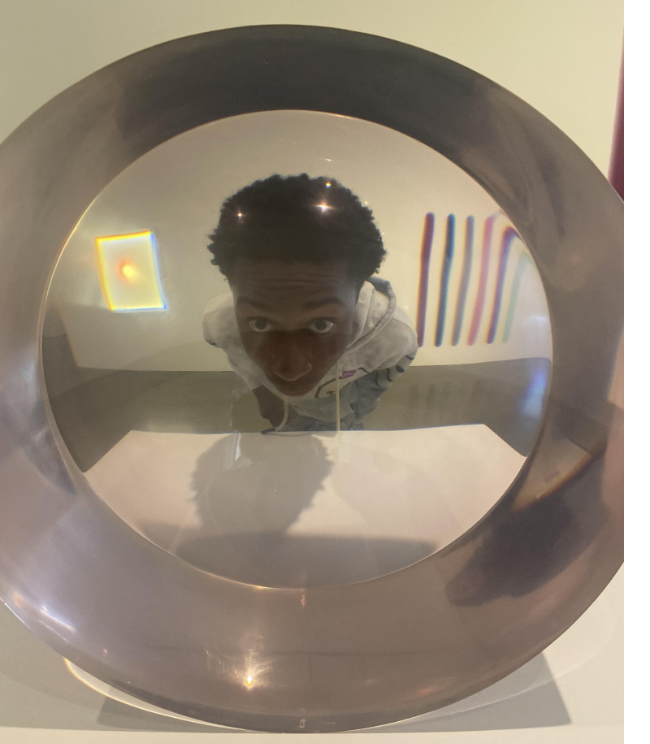Jun Yeeun: Class of 2025
Have you ever had a desire to travel the world just for the sake of traveling or maybe in search of new opportunities? This mentality has rooted itself in the minds of many young people, many of which are within our Honors community.

Jun Yeeun, also known as Kelly, originates from an urban city called Gwangju in South Korea where she grew up. With much enthusiasm, Jun Yeeun described her quiet hometown neighborhood as an image of peace. Her neighborhood channeled the essence of children with street food, lively stores, and colorful walls of art. She recounted the other essential aspects of this place that witnessed her first few years of life: its urbanness and a famous Adventist school directly in front of her home named Hankook Sahmyook High School. While she did not attend this school, many of her family members did. Instead, Jun attended an international school called AIIAS in the Philippines where she learned the English language, interacted with various international classmates, and had the opportunity to dorm.
After spending her childhood in South Korea, she moved to the Philippines where she established herself for 13 years. Jun briefly elaborated on the different lives that citizens face in both countries. While the Philippines is more easy-paced and has kinder people, Korea is very fast-paced: people run all the time, and life is quick. Jun explained that this could be attributed to the weather differences and their impacts on society. The Philippines has a very tropical, rain-or-no-rain climate, whereas Korea has extreme climatic episodes year-round.
Similarly, a major difference between South Korea and California is the weather, in which Jun experienced trouble finding comfort. As a peninsula surrounded by sea, Korea is extremely environmentally and geographically distinct from California. There are many mountains in the northern region of Korea, but not as large as those in the United States. The land is very limited and saturated with apartments and buildings. The extreme summer seasons can compare to the heat in the equatorial regions and to the cold winters in Russia. In America, Jun said the hot weather is the worst; she feels as though she is “baking under the rays of the sun.”
After passionately portraying the beautiful image of the places that saw her grow, she found it simple to answer the following question: why did she pursue a career in the United States? Jun grew up in an English-based international school. Without a Korean education, she could not attend a Korean school. She decided that she wanted to immerse herself in the American system because of how “well-built” it is. The issue that she was most concerned about was if she would receive support in this new country. Fortunately, she could rely on her aunt, the only family she has in the United States.

Once arriving in this new country, Jun did not feel so out of place but felt rather familiar with the schooling system due to her experience at the international school. She grew up in a place with dorms so she was used to the feeling of being alone. Jun stated that her academic life as an international student has placed far less stress on her shoulders because she found classes more relaxed here than in Korea. Education is very competitive in her home country; Korea has a ranking system that is more difficult than in the United States. For example, each student must take a particular test that dictates their life route. Additionally, she found it very interesting that some professors at La Sierra were comfortable being called by their first name; in Korea, this is not the case. Korean professors request to be called with the utmost respect, therefore students only call their professors, “Professor.”
Jun’s social life also changed from what it was like in Korea. “Making friends in America is more open. In Korea, friendship is more respectful with the expectation to be kind to everyone. It’s more conservative and there are limited groups to make friends with.” The feeling of everyone saluting each other without particularly knowing the person is new. She says it can be easy to make friends and greet anyone since they are easier to approach than people in Korea. Skinship is also different in America, she found. “It is not awkward to hold hands or hug. In Korea, everything is common to handshake and bowing,” Jun expressed with surprise.

Jun’s expectations as an international student fell short of reality in many ways. When visiting Los Angeles for the first time, she was surprised to find the roads full of trash and homeless people. Jun thought that the U.S. would be more developed and was surprised that it was not as extraordinary as portrayed in movies. “The United States is overly advertised outside of its own country,” she reflected. Another reality she came across was the issue of having almost everything further away. In Korea, most stores or any necessities are within a five-minute drive. However, all these experiences that Jun has faced have allowed her to see things from a different perspective.
Jun has learned more about herself in the two years she has been in the United States. She was not as energetic in her hometown but rather was more of an introvert. In the United States, she learned to become more extroverted and adventurous. She feels as though she is able to take more risks such as meeting new people and going to new places. She has also learned a new skill, crocheting, which she enjoys. Jun discovered her personal passions whereas before, she used to follow what others would say. Jun can feel confident in making her own way and her own decisions. As a final thought, Jun provided a piece of advice for incoming international students: “Get your driver’s license as soon as possible and get a car!”
Yannik Gibson: Class of 2026

Yannik Gibson, majoring in biology as a pre-medicine student, also expressed his thoughts on moving forward in a new country. Coming from a small, crowded, touristy area on the edge of the Bahamas, New Providence, little was offered in terms of the education he wanted to pursue. With only one pre-medicine program on the entire island, Gibson looked elsewhere for his education. As his mother is an alumnus of La Sierra University, he ultimately decided to study at La Sierra University.
Change characterizes Gibson’s experience as an international student. For example, no AP classes were provided in his home country, but other classes covered topics, such as plants, in a very specific manner. Many of these courses are not offered here in the States. At home, he was also much quieter and more introverted. Being alone has led him to become more independent from his parents, whereas back home he would depend on them; this independence inspired confidence, which also led to a sense of sociality and extroversion. Additionally, Gibson’s hometown was very small. People there are used to seeing the same people every day. Here, he had to adapt to a larger scale of people with many more interactions. At first, he struggled with the fact that most people already knew each other prior to entering college. It was difficult to find friends, but he noticed that it became simpler over time. Something that stood out to him while getting to know others was that “many people find it interesting because I’m from the Bahamas and most didn’t know.” He now has many friends that surround him. Finally, the cold was a major change for him coming from a warm environment.

Outside of Riverside, Gibson has traveled to various other cities such as Miami, Washington D.C., Indianapolis, and San Diego. These cities allowed him to somewhat picture how Riverside could treat him. He was still surprised by the cold weather of Riverside and found it to be less lively than other states he has visited since he expected a more party-like atmosphere. He also expected more international students to be present and was surprised to see very few on the La Sierra campus.

Gibson faces various challenges as an international student. For him, finances are difficult since he has to wait for someone to fly over to California and deposit money. For this reason, he limits his spending greatly when he reaches a low balance. Secondly, he does not have a method of transportation. Without a California license or the opportunity to practice driving, he cannot drive. Therefore, he asks friends for rides when necessary. Also, finding a place to stay during spring break was difficult as his closest relative is in Northern California. Ultimately, he had to stay in the La Sierra dorms.
Gibson is still learning each day about himself and adapting to a new environment. With the hope for a better future, he provides a piece of advice for new international students: “Be ready for culture shock, do everything you love at home before you get here, and do not be afraid to put yourself out there.”
La Sierra University’s international community diversifies the student population and provides a space to learn about and in different cultures. Both Jun Yeeun and Yannik Gibson inspire students to expand their worldviews, one of the Honors Program’s focuses.
— Dulce Guevara (Biomedical Science, Class of 2025)

